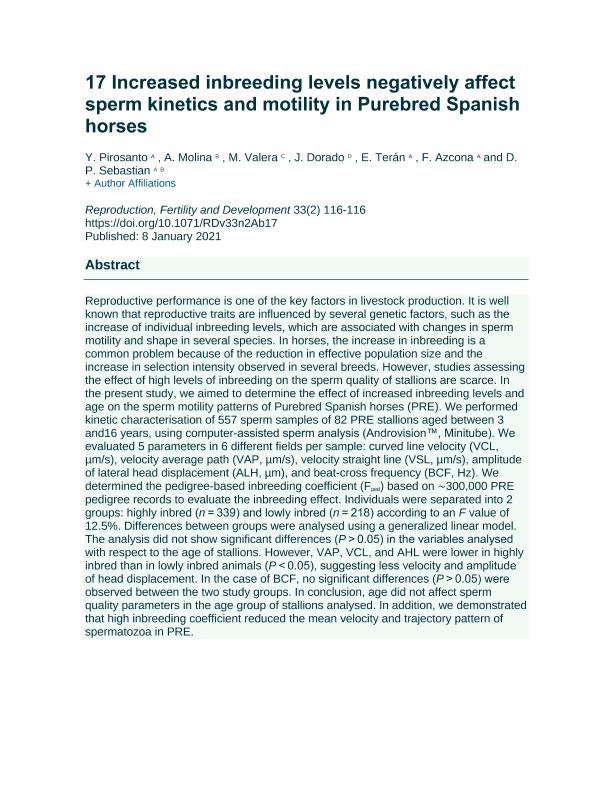Evento
Increased inbreeding levels negatively affect sperm kinetics and motility in Purebred Spanish horses
Pirosanto, Yamila; Molina Alcalá, Antonio; Valera, Maria Analia; Dorado, Jesús; Teran, Ester Mercedes ; Azcona, Florencia
; Azcona, Florencia ; Demyda Peyrás, Sebastián
; Demyda Peyrás, Sebastián
 ; Azcona, Florencia
; Azcona, Florencia ; Demyda Peyrás, Sebastián
; Demyda Peyrás, Sebastián
Tipo del evento:
Conferencia
Nombre del evento:
47th Annual Conference of the International Embryo Tecnology Society
Fecha del evento:
18/01/2021
Institución Organizadora:
International Embryo Technology Society;
Título de la revista:
Reproduction, Fertility and Development
Editorial:
Csiro Publishing
ISSN:
1031-3613
e-ISSN:
1448-5990
Idioma:
Inglés
Clasificación temática:
Resumen
Reproductive performance is one of the key factors in livestock production. It is well-known that reproductive traits are influenced by several genetic factors, such as the increase of individual inbreeding levels, which are associated with changes in sperm motility and shape in several species. In horses, the increase of inbreeding is a common problem due to the reduction in effective population size and the increase in selection intensity observed in several breeds. However, studies assessing the effect of high levels of inbreeding in the sperm quality of stallions are scarce. In the present study, we aimed to determine the effect of increased inbreeding levels? and age on the sperm motility patterns of Purebred Spanish horses (PRE). We performed the kinetic characterization of 557 sperm samples belonging to 82 PRE stallions aged between 3-16 years, using computer-assisted sperm analysis (Androvision?, Minitube, Germany). We evaluated five different parameters in six different fields per sample: curved line velocity (VCL, um/s), velocity average path (VAP, um/s), velocity straight line (VSL, um/s), amplitude of lateral head displacement (ALH, um) and beat-cross frequency (BCF, Hz). We determined the pedigree-based inbreeding coefficient (Fped) based on about 300,000 PRE pedigree records to evaluate the inbreeding effect. Individuals were separated into two highly inbred (n=339) and lowly inbred (n=218) according to an F value of 12.5%. Differences between groups were analyzed using a generalized linear model (GLM).The analysis did not show significant differences (p>0.05) in the variables analyzed with respect to the age of stallions. On the other hand, VAP, VCL and AHL were lower in highly inbred than in lowly inbred animals (p<0.05), suggesting less velocity and amplitude of head displacement. In the case of BCF, no significant differences (p>0.05) were observed between the two study groups.In conclusion, age did not affect sperm quality parameters in the age-group of stallions analyzed. In addition, it was demonstrated that high inbreeding coefficient reduced the mean velocity and trajectory pattern of spermatozoa in PRE.
Palabras clave:
SPERM MOTILITY
,
INBREEDING
,
PUREBRED SPANISH HORSES
Archivos asociados
Licencia
Identificadores
Colecciones
Eventos(IGEVET)
Eventos de INST.DE GENETICA VET ING FERNANDO NOEL DULOUT
Eventos de INST.DE GENETICA VET ING FERNANDO NOEL DULOUT
Citación
Increased inbreeding levels negatively affect sperm kinetics and motility in Purebred Spanish horses; 47th Annual Conference of the International Embryo Tecnology Society; Virtual; Perú; 2021; 116-116
Compartir
Altmétricas



